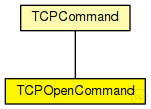 This documentation is released under the Creative Commons license
This documentation is released under the Creative Commons licenseControl info to be used for active or passive TCP open.
localAddr, remoteAddr, localPort, remotePort should be self-explanatory. localAddr is optional because TCP can learn it from IP when a packet is received from the peer; localPort is optional because TCP supports ephemeral ports.
The fork parameter is used with passive open, and controls what happens when an incoming connection is received. With fork=true, it emulates the Unix accept(2) syscall semantics: a new connection structure is created for the connection (with a new connId, see in TCPCommand), and the connection structure with the old connId remains listening. With fork=false, all the above does not happen: the first connection is accepted (with the original connId), and further incoming connections will be refused by TCP by sending an RST segment.
The dataTransferMode and tcpAlgorithmClass fields allow per-connection TCP configuration. The dataTransferMode field set the The tcpAlgorithmClass field may contain name of class subclassed from TCPAlgorithm, respectively. If not set, module parameters with similar names are used.
See also: TcpCommandCode, ITCP
The following diagram shows usage relationships between types. Unresolved types are missing from the diagram.

The following diagram shows inheritance relationships for this type. Unresolved types are missing from the diagram.

| Name | Type | Description |
|---|---|---|
| TCPCommand | class |
Control info for TCP connections. This class is to be set as control info (see cMessage::setControlInfo()) on all messages exchanged between TCP and application, in both directions. Some commands and indications (TCP_C_OPEN_xxx, TCP_I_STATUS) use subclasses. |
| Name | Type | Description |
|---|---|---|
| localAddr | L3Address |
may be left empty |
| remoteAddr | L3Address |
required for active open |
| localPort | int |
required for passive open |
| remotePort | int |
required for active open |
| fork | bool |
used only for passive open |
| dataTransferMode | int |
whether to transmit C++ objects, real bytes or just byte counts. See TCPDataTransferMode. |
| tcpAlgorithmClass | string |
TCP congestion control algorithm; leave empty for default |
| connId | int |
identifies the socket within the application |
| userId | int |
id than can be freely used by the app |
// // Control info to be used for active or passive TCP open. // // localAddr, remoteAddr, localPort, remotePort should be self-explanatory. // localAddr is optional because TCP can learn it from IP when a packet // is received from the peer; localPort is optional because TCP supports // ephemeral ports. // // The fork parameter is used with passive open, and controls what happens // when an incoming connection is received. With fork=true, it emulates // the Unix accept(2) syscall semantics: a new connection structure // is created for the connection (with a new connId, see in ~TCPCommand), // and the connection structure with the old connId remains listening. // With fork=false, all the above does not happen: the first connection // is accepted (with the original connId), and further incoming connections // will be refused by TCP by sending an RST segment. // // The dataTransferMode and tcpAlgorithmClass fields // allow per-connection TCP configuration. // The dataTransferMode field set the // The tcpAlgorithmClass field may contain name of class subclassed from // TCPAlgorithm, respectively. // If not set, module parameters with similar names are used. // // @see ~TcpCommandCode, ~ITCP // class TCPOpenCommand extends TCPCommand { L3Address localAddr; // may be left empty L3Address remoteAddr;// required for active open int localPort = -1; // required for passive open int remotePort = -1; // required for active open bool fork = false; // used only for passive open int dataTransferMode @enum(TCPDataTransferMode); // whether to transmit C++ objects, real bytes or just byte counts. See ~TCPDataTransferMode. string tcpAlgorithmClass; // TCP congestion control algorithm; leave empty for default }